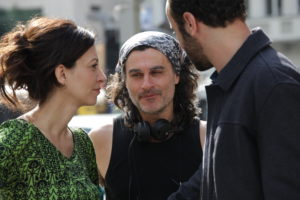
Filming “The Attack”, l to r
Reymond Amsalem (Siham), director Ziad Doueiri, Ali Suliman (Amin)
Photo: Vered Adir
Whenever I see a film that is set against the backdrop of the Israeli-Palestinian conflict, I try to guess in advance how many minutes it will take for it to become obvious whose side the filmmaker is on. The cinematic tropes are often repetitive, predictable and depressing.
So when I went to see “The Attack”, now playing at the Edina Landmark Theatre, I found myself still counting the minutes when the film ended. Co-written and directed by Lebanese director Ziad Doueiri, “The Attack” explores the emotional aftermath of suicide terrorism.
The film, which premiered last month at the Jerusalem Cinematheque to sold-out audiences, has been banned in Lebanon. “With the exception of Morocco, so far no Arab country has agreed to release it.” That is a shame, because Doueiri’s film tackles painful, complicated issues with sensitivity and nuance.
Dr. Amin Jafaari (Israeli actor Ali Suliman) is a highly respected Tel Aviv surgeon. The film opens with him receiving a prestigious award for his work and a standing ovation from his colleagues, mostly Jewish Israelis. He lives a prosperous, comfortable lifestyle in an elegant villa in Herzliya. Moving easily between Arabic and Hebrew, he seems the model of what peaceful coexistence can be.
Amin is married to the beautiful Siham (Israeli actress Reymond Amsalem) with whom he shares a deep and passionate love.
All of this changes suddenly when a suicide bomber detonates in a Tel Aviv restaurant, killing seventeen people, among them eleven children at a birthday party. Hours after working feverishly to save the injured children, Amin is asked to identify the shattered corpse of his wife.
He clings to the idea that Siham was simply an innocent victim of the attack, but mounting evidence that she was indeed the perpetrator force him to confront hard questions and the dawning realization that perhaps his wife had another, secret life. Who was Siham? Why did she do this? And who was responsible for transforming his wife into a terrorist?
Seeking answers to those questions, Amin heads to the West Bank city of Nablus, and there he learns how his wife came to be radicalized. The incendiary words of Sheikh Marwan, calling for Israel’s destruction, fill the air. Here Siham is a hero, and her image gazes down at Amin from posters plastered everywhere.
As the Israelis continue their investigation, Amin must decide what to do with information that confirms beyond all doubt that Siham was the bomber. The competing demands of morality vs. identity lie at the heart of Amin’s struggle.
The film’s most glaring error is the “Jenin Massacre,” the event that ostensibly caused Siham to snap, making it possible for her to be radicalized. A “Ground Zero” sign in English only adds to the distortion. While the UN has completely discredited the idea that Israeli soldiers massacred civilians during an incursion into the West Bank town to root out terrorists, the “massacre” has served as a powerful propaganda and recruitment tool.
Did the director really believe the Jenin propaganda or was he just trying to show us how easily Siham was manipulated by lies? I wondered how many in the audience had sufficient background to consider this question.
I think it took a lot of courage for an Arab to make this film. Not only did Doueiri break Lebanese law by making a movie in Israel, he portrays Israel in a generally positive light. You see a modern, open society in which Arabs can build a good life. Amin’s Jewish friends are loyal and supportive as the horror of his situation unfolds. While filmed with restraint, Doueiri nonetheless delivers to the audience the barbarity of suicide bombings-the mangled children, the hysterical parents, Sihams half-corpse lying in he hospital morgue.
Doueiri tackles the issue of Palestinian identity and leaves us with more questions than answers. Amin’s niece in Nablus asks, “What is it like to live among them?”, meaning among the Jews. West Bank Palestinians see him as a sell-out, beneath contempt. An Israeli police officer angrily accuses Amin and Siham of destroying all the trust between Jewish and Arab Israelis. Upon Amin’s return from Nablus, fellow physician Kim (Evgenia Dodena), sees a change in her friend. She has been the most steadfast supporter among Amin’s many Jewish friends. “What do you owe a country that has given you so much?” she asks. Says Amin, “Everything I have, I earned.” Deeply distraught, she replies, “Yes, but what country made that possible?”
Can an Arab ever truly be an Israeli? And if so, has he betrayed his roots? These questions are part of Israeli-Palestinian reality and defy easy answers. The choice that Amin makes at the end of the film will haunt you long after the last of the credits have rolled.

